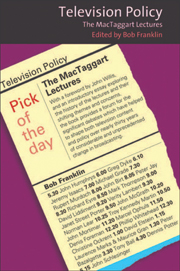Book contents
- Frontmatter
- Contents
- Acknowledgements
- Foreword
- Introduction
- The James MacTaggart Lectures
- TV Drama: The Case against Naturalism
- Naturalism and Television
- Taboos in Television
- Signposting Television in the 1980s: The Fourth Television Channel
- Television Drama, Censorship and the Truth
- The Day after Tomorrow: The Future of Electronic Publishing
- The Primacy of Programmes in the Future of Broadcasting
- Reflections on Working in Film and Television
- ‘Opening up the Fourth Front’: Micro Drama and the Rejection of Naturalism
- Power and Pluralism in Broadcasting
- Ethics, Broadcasting and Change: The French Experience
- Freedom in Broadcasting
- Deregulation and Quality Television
- The Future of Television: Market Forces and Social Values
- The Future of the BBC
- Occupying Powers
- A Culture of Dependency: Power, Politics and Broadcasters
- Talent versus Television
- A Glorious Future: Quality Broadcasting in the Digital Age
- Rewarding Creative Talent: The Struggle of the Independents
- Television versus the People
- Public-Interest Broadcasting: A New Approach
- A Time for Change
- The Soul of British Television
- Television's Creative Deficit
- Freedom of Choice: Public-Service Broadcasting and the BBC
- First Do No Harm
- Appendix A Edinburgh International Television Festival, 29 August–2 September 1977: Programme
- Appendix B Précis of Ted Turner, James MacTaggart Lecture 1982; Dr Jonathan Miller, James MacTaggart Lecture 1983
- Index
‘Opening up the Fourth Front’: Micro Drama and the Rejection of Naturalism
from The James MacTaggart Lectures
Published online by Cambridge University Press: 05 August 2013
- Frontmatter
- Contents
- Acknowledgements
- Foreword
- Introduction
- The James MacTaggart Lectures
- TV Drama: The Case against Naturalism
- Naturalism and Television
- Taboos in Television
- Signposting Television in the 1980s: The Fourth Television Channel
- Television Drama, Censorship and the Truth
- The Day after Tomorrow: The Future of Electronic Publishing
- The Primacy of Programmes in the Future of Broadcasting
- Reflections on Working in Film and Television
- ‘Opening up the Fourth Front’: Micro Drama and the Rejection of Naturalism
- Power and Pluralism in Broadcasting
- Ethics, Broadcasting and Change: The French Experience
- Freedom in Broadcasting
- Deregulation and Quality Television
- The Future of Television: Market Forces and Social Values
- The Future of the BBC
- Occupying Powers
- A Culture of Dependency: Power, Politics and Broadcasters
- Talent versus Television
- A Glorious Future: Quality Broadcasting in the Digital Age
- Rewarding Creative Talent: The Struggle of the Independents
- Television versus the People
- Public-Interest Broadcasting: A New Approach
- A Time for Change
- The Soul of British Television
- Television's Creative Deficit
- Freedom of Choice: Public-Service Broadcasting and the BBC
- First Do No Harm
- Appendix A Edinburgh International Television Festival, 29 August–2 September 1977: Programme
- Appendix B Précis of Ted Turner, James MacTaggart Lecture 1982; Dr Jonathan Miller, James MacTaggart Lecture 1983
- Index
Summary
Troy Kennedy Martin picks up the cudgels first wielded by John McGrath a decade earlier in his ‘swingeing attack on naturalism’. He defines naturalism in television as ‘actors talking in contemporary dress against a contemporaneous background’ intended to offer ‘a replication of real life. In dramatic terms it is the mediation of story through dialogue’; he concludes that naturalism is ‘basically phoney’.
Kennedy Martin proposes to open up a ‘fourth front’ alongside plays, series and serials, which would deal with ‘micro drama’ composed of ‘dozens of fragments of drama, shards of experience made and put out very quickly’. Micro drama should embrace three key elements of advertising commercials which contrast sharply with television drama. First, ad copywriters condense information while playwrights tend to expand it. Second, in television drama the budget contracts with the length of the piece but in adverts there is no necessary connection between cost and duration. Finally, adverts reinforce their message through repetition whereas in television drama a repeat is a failure to provide something new. Kennedy Martin envisages a number of advantages to these micro dramas: repetition reinforces impact but also defrays costs. But the micro dramas should also employ similar styles ‘in which time itself is altered and naturalism goes out of the window’.
- Type
- Chapter
- Information
- Television PolicyThe MacTaggart Lectures, pp. 105 - 112Publisher: Edinburgh University PressPrint publication year: 2005



